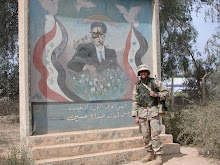I decided to write How to Break a Terrorist because I am opposed to torture. I believe that we will stop terrorist attacks by being smarter, not harsher. Torture is fundamentally against the principles that I swore to defend -- freedom, liberty, and justice -- and our torture policy is a recruiting tool for Al Qaida.
We are capable of using better methods of interrogation. Although the methods in the Army Manual are effective tools, the basic interrogation model needs improvement. Interrogation follows a simple formula of analyzing motivations and then applying incentives. The Army interrogations school glosses over this methodology and places the majority of emphasis on the approach methods. The approach methods are simply delivery vehicles for packaging the incentive. This way of teaching interrogation does not stress the importance of identifying a detainee's motivations and then applying an appropriate incentive. As a result, interrogators waste time haphazardly going through the sixteen, more or less, approved approaches instead of focusing on a detainee's motivations, which can be discovered through relationship building. Once a detainee's motivations are uncovered, then the interrogator can apply a proper incentive that maximizes the opportunity for cooperation.
It is also important for interrogators to realize that the strongest incentives are intangible, such as pride, ego, wasta (status), hope, cause, religion, principles, obligations, and relationships. These are what the interrogator is selling, and the approaches, although important, are merely wrapping.
There are numerous criminal interrogation techniques, or ruses, that can be effectively used by intelligence interrogators. The Army interrogation school should hire experienced criminal investigators to share their knowledge of these techniques. In my time in Iraq, I realized that most Army interrogators had no knowledge of basic criminal interrogation techniques. There is an entire untapped wealth of interrogation skills, none of which involve harsh treatment or torture, that could be legally, and humanely, used by intelligence interrogators. For example, the most commonly discussed criminal interrogation technique is Good Cop/Bad Cop, but there are many others.
For an excellent argument against torture and abuse, I encourage readers to check out the following article by Colonel Steve Kleinman (one of the most experienced and educated interrogators in our country) and Haviland Smith (a retired CIA station chief):
Abuse Has No Place in Interrogation Policy.
skip to main |
skip to sidebar

At one point the reward was $25 million, but Coalition Forces dropped it to $10 million.

Air Force F-16s dropped the bombs.



June 7th, 2006

The news of Zarqawi's death was celebrated across Iraq (courtesy AP Images).

Carried out by Zarqawi's associate, this bombing incited the civil war between Sunni and Shia (courtesy AP Images).

The Egyptian, he was Zarqawi's right hand man and is now the leader of Al Qaida in Iraq.

Zarqawi's Spiritual Advisor.

Zarqawi delivering a sermon. This was the last video of him before his death.

Unable to reload his weapon.

Major General Caldwell informing the press of Zarqawi's death.

April 2003, just short of "mission accomplished."
By Matthew Alexander
Interview with Paul Harris on KTRS
"The things that make you a good American are the same things that make you a good interrogator."
-- Matthew Alexander
-- Matthew Alexander
World War II Interrogators
Contact the Author
I'll take your questions at:
howtobreakaterrorist@
gmail.com
I'll post responses here on the blog.
howtobreakaterrorist@
gmail.com
I'll post responses here on the blog.
How to Break a Terrorist was co-authored by John R. Bruning with a Preface by Mark Bowden, author of Black Hawk Down and Killing Pablo.
Order from:
Reward Poster

At one point the reward was $25 million, but Coalition Forces dropped it to $10 million.
The Airstrike

Air Force F-16s dropped the bombs.


Deceased Zarqawi

June 7th, 2006
Iraqi Soldiers Celebrating.

The news of Zarqawi's death was celebrated across Iraq (courtesy AP Images).
The Golden Dome Mosque

Carried out by Zarqawi's associate, this bombing incited the civil war between Sunni and Shia (courtesy AP Images).
Abu Ayyub al Masri

The Egyptian, he was Zarqawi's right hand man and is now the leader of Al Qaida in Iraq.
Sheikh Abu Abd' al Rahman

Zarqawi's Spiritual Advisor.
Preacher of Hate

Zarqawi delivering a sermon. This was the last video of him before his death.
Zarqawi

Unable to reload his weapon.
Press Release

Major General Caldwell informing the press of Zarqawi's death.
Baghdad International Airport

April 2003, just short of "mission accomplished."
Recommended Reading
Click on the book images below to read about these books.
About the Authors
- Matthew Alexander
- Matthew Alexander has served for over eighteen years in the U.S. Air Force and Air Force Reserves. As the leader of an elite interrogations team in Iraq, he conducted or supervised more than 1,300 interrogations. He is a veteran of three wars and was awarded the Bronze Star Medal in 2006 for his achievements in Iraq, including leading the interrogations that led to the killing of Abu Musab Al Zarqawi, the notorious Al Qaeda leader.




